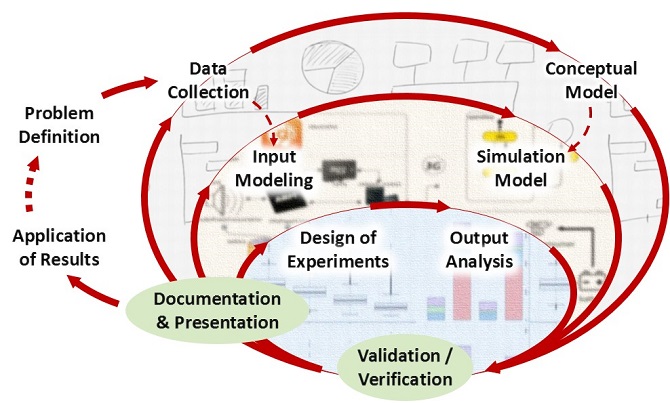Simulation and Modeling 1 (WS 2022/23)

Details
| Type of Course | Lecture (2 SWS) + Exercise (2 SWS) |
| ECTS Credits | 2,5 + 2,5 |
| Language | English |
| Lecture | Wednesday, 2:15 pm – 3:45 pm, room H4 campo |
| Exercises |
Monday, 10:00 am – 12:00 pm, room 01.153-113 CIP campo Monday, 2:00 pm – 4:00 pm, room 01.153-113 CIP campo Monday, 4:00 pm – 6:00 pm, room 01.153-113 CIP campo The exercises start on Monday, 24th Oktober. |
In case of any questions, contact sam1@i7.informatik.uni-erlangen.de
Overview of the various kinds of simulation, discrete simulation (computational concepts, simulation of queuing systems, simulation in Java, professional simulation tools), required probability concepts and statistics, modeling paradigms (e.g., event/process-oriented, queuing systems, Petri nets, UML statecharts), input modeling (selecting input probability distributions), random number generation (linear congruential generators and variants, generating random variates), output analysis (warm-up period detection, independent replications, result presentation), continuous and hybrid simulation (differential equations, numerical solution, hybrid statecharts), simulation software, case studies, parallel and distributed simulation.
The exercise is optional. You can earn bonus points for the exam. It will be a mixture of practical simulation tasks (as homework / with support during the exercise) and interactive theoretical exercise sessions.
Contents include: Calculation of expected values with the aid of probability theory, determination of confidence intervals, creation of simulation models using AnyLogic, hybrid modeling with statecharts, data collection and distribution fitting.
Contents include: Calculation of expected values with the aid of probability theory, determination of confidence intervals, creation of simulation models using AnyLogic, hybrid modeling with statecharts, data collection and distribution fitting.
The exercises will be held on Mondays and serve for practice of theory, usage of various tools, and for preparation of assignments. It will also have some exercise with interactive solving of theoretical tasks.
When questions arise, please use the message board in StudOn. Personal questions can be asked at sam1@i7.informatik.uni-erlangen.de.
When questions arise, please use the message board in StudOn. Personal questions can be asked at sam1@i7.informatik.uni-erlangen.de.
Law, Kelton: “Simulation Modeling and Analysis.” 5rd edition, McGraw Hill, 2014.
AnyLogic in 3 Days (free tutorial book)
AnyLogic in 3 Days (free tutorial book)